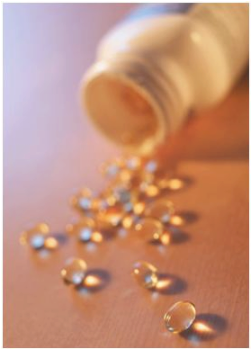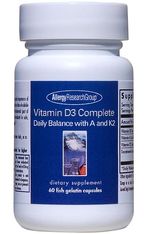
By now most people know about the health benefits of vitamin D. It's been linked to cancer prevention, calcium absorption, neuromuscular function, mood and the immune system. Supplementation with vitamin D is important, especially in climates where sun exposure is limited. Even in sunny climates some individuals who get little exposure to the sun require oral supplementation of vitamin D.
Food sources of vitamin D are limited but include fish (cod liver oil has the highest), eggs, and fortified dairy products. The best source of vitamin D is the sun. All it takes is 20-30 minutes a day of exposing large areas of skin for Caucasians to get adequate levels of vitamin D. It can take 3-6 times more for darkly pigmented skin. When my family and I head out in the sun we rarely use sunscreen which can block vitamin D formation in the skin. If we're going to be out for a long day in the sun during the summer I wait 20-30 minutes after we've been out before I apply natural, chemical-free sunscreen.
The best way to determine whether or not you need oral supplementation is to test your blood levels of the active form of vitamin D, 25(OH)D. Most labs reference ranges are around 25-60 ng/ml. Labs make this determination based on levels from the general population. However, it's thought that 70% of the general population is deficient, so this is not an accurate reference for ideal levels. Optimal levels are in the range of 50-80 ng/ml.
Food sources of vitamin D are limited but include fish (cod liver oil has the highest), eggs, and fortified dairy products. The best source of vitamin D is the sun. All it takes is 20-30 minutes a day of exposing large areas of skin for Caucasians to get adequate levels of vitamin D. It can take 3-6 times more for darkly pigmented skin. When my family and I head out in the sun we rarely use sunscreen which can block vitamin D formation in the skin. If we're going to be out for a long day in the sun during the summer I wait 20-30 minutes after we've been out before I apply natural, chemical-free sunscreen.
The best way to determine whether or not you need oral supplementation is to test your blood levels of the active form of vitamin D, 25(OH)D. Most labs reference ranges are around 25-60 ng/ml. Labs make this determination based on levels from the general population. However, it's thought that 70% of the general population is deficient, so this is not an accurate reference for ideal levels. Optimal levels are in the range of 50-80 ng/ml.

Supplementation isn't always straightforward. Vitamin D is fat soluble and absorbed in the small intestines. Several other vitamins are fat soluble as well, like vitamin A, E and K. If one is taking large doses of one it can create a deficiency of other fat soluble vitamins because the rate of absorption in the small intestines is limited. New research shows that vitamin A and D work synergistically and it is wise to take them together. Vitamin K, another fat soluble vitamin found in green leafy and other vegetables, is important for blood clotting and bone formation. Taking these vitamins together can help to optimize their ability to be used by the body.

Allergy Research Group, a leader in the supplementation industry that I have trusted for years, has made a supplement that provides a balanced dose of all four fat soluble vitamins. It contains:
- vitamin D 2,000 IU
- vitamin A 3,000 IU
- vitamin K 100 µg
- tocotrienols 5 mg

 RSS Feed
RSS Feed
